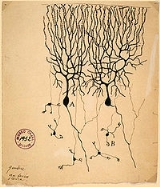
Neuron
Overview
A neuron is an electrically
excitable cell
that processes and transmits information by electrical and chemical signaling. Chemical signaling occurs via synapse
s, specialized connections with other cells. Neurons connect to each other to form networks
. Neurons are the core components of the nervous system
, which includes the brain
, spinal cord
, and peripheral ganglia. A number of specialized types of neurons exist: sensory neuron
s respond to touch, sound, light and numerous other stimuli affecting cells of the sensory organs
that then send signals to the spinal cord and brain.
Electricity
Electricity is a general term encompassing a variety of phenomena resulting from the presence and flow of electric charge. These include many easily recognizable phenomena, such as lightning, static electricity, and the flow of electrical current in an electrical wire...
excitable cell
Cell (biology)
The cell is the basic structural and functional unit of all known living organisms. It is the smallest unit of life that is classified as a living thing, and is often called the building block of life. The Alberts text discusses how the "cellular building blocks" move to shape developing embryos....
that processes and transmits information by electrical and chemical signaling. Chemical signaling occurs via synapse
Synapse
In the nervous system, a synapse is a structure that permits a neuron to pass an electrical or chemical signal to another cell...
s, specialized connections with other cells. Neurons connect to each other to form networks
Neural network
The term neural network was traditionally used to refer to a network or circuit of biological neurons. The modern usage of the term often refers to artificial neural networks, which are composed of artificial neurons or nodes...
. Neurons are the core components of the nervous system
Nervous system
The nervous system is an organ system containing a network of specialized cells called neurons that coordinate the actions of an animal and transmit signals between different parts of its body. In most animals the nervous system consists of two parts, central and peripheral. The central nervous...
, which includes the brain
Brain
The brain is the center of the nervous system in all vertebrate and most invertebrate animals—only a few primitive invertebrates such as sponges, jellyfish, sea squirts and starfishes do not have one. It is located in the head, usually close to primary sensory apparatus such as vision, hearing,...
, spinal cord
Spinal cord
The spinal cord is a long, thin, tubular bundle of nervous tissue and support cells that extends from the brain . The brain and spinal cord together make up the central nervous system...
, and peripheral ganglia. A number of specialized types of neurons exist: sensory neuron
Sensory neuron
Sensory neurons are typically classified as the neurons responsible for converting external stimuli from the environment into internal stimuli. They are activated by sensory input , and send projections into the central nervous system that convey sensory information to the brain or spinal cord...
s respond to touch, sound, light and numerous other stimuli affecting cells of the sensory organs
Sense
Senses are physiological capacities of organisms that provide inputs for perception. The senses and their operation, classification, and theory are overlapping topics studied by a variety of fields, most notably neuroscience, cognitive psychology , and philosophy of perception...
that then send signals to the spinal cord and brain.
Unanswered Questions
Discussions

